Sep 24, 2023
By Fr. Ben Berinti, C.PP.S.
Arriving at Brunnerdale High School Seminary at the tender age of 14, I entered a vast ocean of experiences, sometimes the waves throwing me onto the shore, and sometimes dragging me out into the deep. Trying to fight the onset of homesickness, I wandered into our spiritual reading library, located just off the chapel, hoping that my immersion in holy literature would slow the tears.
For some reason, a little wisp of a book caught my attention. The text was already 11 years old when I laid my fingers to the spine in 1972, but its title and content continue to challenge me now 62 years since its original publication. I speak of J. B. Phillips’ Your God Is Too Small.
Such is the challenge at the heart of Matthew’s wonderfully annoying parable of the landowner and his hired workers. Truth be told, when faced with similar situations of uneven distribution of material, physical, spiritual, intellectual and emotional goods in our own lives, I suspect we answer the landowner’s question, “Are you envious because I am generous?” with a rousing, “You’re darn right I am!”
The prophet Isaiah and the words of Psalm 145 clearly lay out the vastness of God’s qualities: generous, forgiving, gracious, merciful, slow to anger, abundantly kind, compassionate—and all of these are the channels through which God’s justice flows.
Our God is too small when our sense of God’s justice is measured on scales intended to “balance.” Our God is too small when we argue with God that God hasn’t been “fair.” Our God is too small when we are humbled to receive God’s gracious mercy but are unwilling to see it dispensed to those whom we feel haven’t yet “paid the price” for their sins. Our God is too small when we call down the “wrath of God” on those whom we believe deserve the heat because of their poor choices. Our God is too small when we see God’s presence in one set of people more than in another set of people.
Mercy, prodigal forgiveness, reconciliation, giving more than is deserved—all speak of our God, whose gestures of love and healing are never cramped. Should these qualities of God seem strange to our Community, which is rooted in the charism of Christ’s kenotic gift of his Blood? I hope not.
Moved by the self-emptying, expansive gift of Christ’s Blood on the Cross, we are invited into an expansion of our minds and hearts. Paul speaks to the Philippians of “magnifying Christ”—enlarging the Christ who dwells within and around us through the bountiful grace of the Holy Spirit. We will find a greater capacity to embrace a larger rather than smaller God, the more we magnify Christ in our seeing, thinking and deciding.
So many years ago, I found comfort as a timid, homesick teenager in the yellowed pages of J. B. Phillip’s tiny little book because he introduced me to a God who was large enough to embrace what I was too small to grasp.
In those closing words the landowner speaks to his grumbling servants, we find the invitation to gratefully embrace the expansive generosity and justice of a God whom we often make too small.
Can we move from grumbling to gratitude?

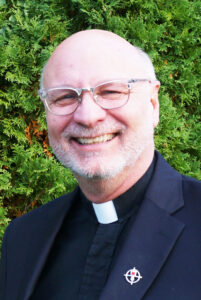
Fr. Ben Berinti, C.PP.S., is the pastor of Immaculate Conception Church in Melbourne Beach, Fla. He is also a member of the provincial council of the Missionaries’ United States Province.
Sep 16, 2023
By Brother Brian Boyle, C.PP.S.
The three readings touch on forgiveness and compassion for one another. I want to focus on the interconnectedness of the human family and the implications of that.
The Sirach reading gives practical guidance on forgiving others who have hurt us. Sirach asks, how can we ask the Lord for forgiveness when we fight with our neighbors? It is as if he wants to say, “Get real, if the Lord punishes you, don’t come crying to me.”
Paul speaks directly on the interconnectedness of each other through Christ. We are all part of Christ’s body. Making conflict with each other only hurts the body. Practicing forgiveness and compassion with each other strengthens it.
In the Gospel, we hear the parable of the unmerciful servant. A modern re-telling of this parable might look like this: There was a CEO of a corporation who declined to take administrative action upon a supervisor who begged for forgiveness. Upon leaving the CEO’s office, the supervisor fired a staff person for a petty infraction. Word got back to the CEO. He then turned around and fired the supervisor.
Leaders don’t lead in a vacuum. They need the support of the people who follow them. Practicing forgiveness makes the body of people stronger. My friend and colleague enlisted in the U.S. Army upon high school graduation. One day he neglected to read a duty list and he found out he was 15 minutes late to a scheduled guard duty on his base. He describes how his commanding officer held him accountable without taking administrative action on him. This experience made him a better soldier and he used that experience in how he led other soldiers. He uses that experience in leading a church congregation today.
What if the Messiah comes and nothing changes? That depends upon us. The Lord has probably forgiven us many more times than we would care to know. The Lord forgives us but is more than likely not going to force us to forgive each other. No Jedi mind tricks. Forgiving each other is our responsibility.


Brother Brian Boyle, C.PP.S., is a hospital chaplain in Northwest Indiana. He is also the associate director of Companions (lay associates) of the Missionaries of the Precious Blood.
Sep 9, 2023
By Fr. Matt Keller, C.PP.S.
Paul in our scriptures today instructs us “to love one another” (Romans 13: 8). On the surface we like this instruction, this instruction gives us a warm fuzzy feeling inside, and many easily jump on board to follow this instruction without giving any thought. I mean who would object to loving one another?
It is easy to love another who thinks like me, and it is easy to love another who listens to me. But can I love another who is opposite of me, who thinks differently than me, and who does not listen to me? When I think about the one who is opposite of me and the invitation to love, this invitation has me second guessing myself—not so much if I could follow this instruction but if I even want to. It can be hard to love someone who is different.
In our Scriptures today, through Ezekiel and Jesus we are given examples to love in a way that can make us feel uncomfortable. We are instructed today on the importance of confronting the wicked and sinners about their wrong. We may like the idea of confronting the wicked and sinners, but sometimes doing this can make us feel very uncomfortable. Many, me included, fear the negative response that I might get when I speak up. Will they even listen to what I have to say?
Ezekiel points out if we do not speak up, the wicked will die because of their sin, and we will be responsible for their death because we did not speak up. We do not want to be responsible for another person’s death so we need to speak up. Perhaps we are looking at it a different way: rather than speaking up to confront the wicked or the sinner, what we are called to do is confront the situation. We speak up to the wicked or the sinner because we care, because we love the wicked or the sinner.
But what if they will not listen when we speak to them? Jesus gives us a practical solution: speak one on one, and if that does not work, “take one or two others along with you” (Matthew 18: 15). If that does not work, tell the church, and if that does not work then treat them “as you would a Gentile or tax collector” (Matthew 18: 17).
We might interpret treating a Gentile or tax collector as treating them like dirt. Many in the culture of Jesus’ time would have treated these people this way. If we look to Jesus’ example, he did not. Jesus treated Gentiles and tax collectors with love, respect and dignity as he ate and socialized with them. And it is usually when he spent time with them that there was a change of heart.
For example, when Jesus spent time at Zacchaeus’s house, Zacchaeus said “Behold, half of my possessions, Lord, I shall give to the poor, and if I have exhorted anything from anyone, I shall repay it four times over” (Luke 19:8).
For it is when we treat the wicked and sinners with love, dignity, respect and Christ’s light that we make darkness, wickedness, and sinners uncomfortable and it fights but flees away. Hearts get changed and we win over.
To view the full scripture reading, click here.

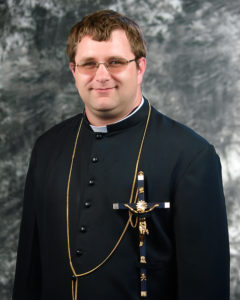
Fr. Matt Keller, C.PP.S., is the pastor of St. John the Baptist Church in Glandorf, Ohio.
Sep 2, 2023
The heart itself is but a small vessel, yet there are dragons and there are lions; there are poisonous beasts and all the treasures of evil. And there are rough and uneven roads; there are precipices. But there is also God, also the angels, the life and the kingdom, the light and the apostles, the treasures of grace—there are all things. – Pseudo-Macarius, 5th Century
By Brother Matt Schaefer, C.PP.S.
Some years ago, I was going through some spiritual struggles. I had recently completed my formation with the Missionaries of the Precious Blood, and I was trying to figure out how I would live in the world as a Missionary brother. I’d made a commitment to God and to my fellow Missionaries; but how did God want me to live out that commitment? What was I supposed to do about the internal struggle between selfish desires and selfless service? Between my own will and God’s will?
Fortunately, I had a very good spiritual director who helped me sort out my thoughts. She gave me a reading that included the above quote from an unknown homilist. The author offers a wonderful picture of the contradictions residing in the human heart: the capacity to do wrong or do right, the presence of both darkness and the light of God, treacherous beasts and guiding angels. With all that going on, it is no wonder that discerning the will of God can be challenging.
In today’s Gospel, Jesus has a hard lesson for the disciples about God’s will, both for Jesus and for them. Jesus tells them that he will suffer, be killed, and be raised. Peter cannot accept this. The Messiah was expected to be a victorious warrior who would conquer their enemies and lead an earthly kingdom for God’s chosen people. Such a Messiah could not suffer and die. Perhaps Peter was hoping that the loyal disciples would also be spared suffering. Jesus rebukes Peter, “Get behind me, Satan.” This seems harsh, but it highlights the ever-present temptations that interfere with our discernment of God’s will. And Jesus doesn’t say, “Go away, Satan!” No, he instructs Peter to get behind him—in other words, to follow him.
Jesus then instructs his disciples to deny themselves, take up their crosses, and follow him. Denying oneself is not about putting yourself down or erasing your unique identity; it is about respecting yourself as a child of God. To follow Jesus fully, we must avoid selfish desires and worldly temptations so that our lives will be ordered to the will of God. Taking up our crosses isn’t just about accepting the trials and annoyances of life; it means embracing everything that comes with a life devoted to Jesus. Remember that the cross was not just a means of death; it was a shameful and horrific punishment. But we know also the glorious message of the cross—that it is the source of our redemption. Those who are willing to pay the price will be vindicated.
Poor Peter’s heart, like my own, surely had its beasts, temptations, and rocky roads; but in the end he listened to the good things that resided there. He let the angels and the grace of God guide him in his journey to follow Jesus. The will of God is discerned through Scripture, through the teachings and sacraments of the Church, and through prayer. Indeed, the will of God is already present in our hearts; we just have to find it amidst all the distractions. Taking Peter and the disciples as models, may we always be committed to discerning God’s will and following him with joyful, undivided hearts.

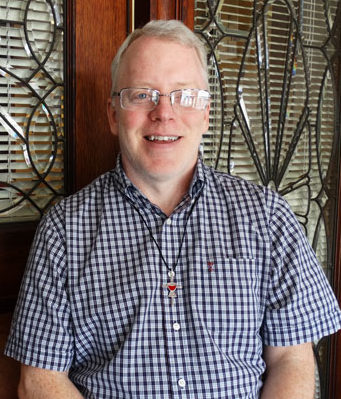
Brother Matthew Schaefer, C.PP.S., is in ministry at the St. Gaspar Family of Parishes in Dayton.
Aug 26, 2023
By Fr. Tim McFarland, C.PP.S.
Many times, we hear people having an identity crisis or perhaps we have experienced that in our lives. Today’s Gospel introduces us to ways in which people were discovering and growing in their understanding of Jesus. This can also speak to the ways in which we grow in our understanding of who Jesus is for us. Throughout our lives our image of Jesus changes in response to our situation. Old images of Jesus pass and new ones come to be.
Each of us needs to give a personal answer to Jesus’ question: “Who do you say that I am?” Peter’s response is a solid basis from which to begin. Notice that the phrase “Son of the Living God” expresses more richly what “Christ” means. Peter’s faith comes to him as gift from above, not from any mere logic or ingenuity. Why was the blessing given to him in particular? Perhaps because his humble and contrite spirit made him best prepared to receive it? Or because God chooses whom he wills, irrespective of their merits? Jesus entrusts to Peter whatever is meant by the keys of the Kingdom of Heaven. Upon his solid, dedicated faith the Church will always rely, for unity and encouragement.
This Sunday we are presented with two figures who are given keys. The first is Eliakim. Eliakim was the secretary to Shebna, the Master of King Hezekiah’s palace, back in the 8th century before Christ. According to the first reading from Isaiah, Shebna lost favor with the Lord and was replaced by Eliakim. Isaiah says that God placed the keys of the kingdom on Eliakim’s shoulder. He would be Master of the palace and the one through whom others would have to go to get access to the King.
The Gospel reading presents Peter as receiving the keys of the Kingdom of God. Like Eliakim, he would determine who has access to the King. Peter is usually pictured as carrying large keys, representing the authority given to him by the Lord. It is interesting that Peter, whom we know had his weaknesses, receives the keys to the Kingdom. This should give us hope that despite our weaknesses and failures, we too are called to proclaim the Kingdom in word and action.
In these passages, keys are interpreted as signs of authority and that is the foundation for our belief in the authority of the pope, Peter’s successor. I suggest that we might look at the key in a different way. A key can also be seen as a guide, like an answer key to an exam. Our faith in Jesus gives us a key to better understand our lives. We can use the “key” of our Precious Blood spirituality. Our spirituality can give us a key to cope with suffering in our lives, to reconcile differences among people, and to form communities. The scriptures today pose a question, similar to the question posed by Jesus: how does our faith, our spirituality, serve as a key to our lives?
To view the full scripture reading, click here.

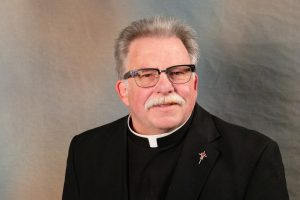
Fr. Tim McFarland, C.PP.S., is the director of ministry and mission and serves on the faculty at Calumet College of St. Joseph in Whiting, Ind.
Aug 19, 2023
By Vicky Otto
The older I get, the more I admire the women we read about in the Gospels. Each, in their way, has taught me essential life lessons. Mary taught me the importance of saying yes to God. The women who stood at the crucifix demonstrated the importance of fidelity to relationships. And Mary Magdalene taught me about bravery, courage and speaking truth to power.
This weekend, I add the voice of the Canaanite woman in the Gospel that we hear proclaimed this week. A friend this week told me that when she read a reflection about her, the chapter was called “The Uppity Woman.” I have learned a lot from uppity women; this Sunday, the lesson is about tenacity, persistence and faith, even when faced with one obstacle after another.
This week’s Gospel can be challenging to proclaim, preach about, and listen to because the comments Jesus makes can be perceived as harsh and insensitive. It is important to note that Jesus’s words and actions to the Canaanite woman made sense for his time and culture. It does not make them right, yet it is the world in which Jesus and the woman meet.
This meeting of the two is the first lesson the woman offers; she shows up. She shows up knowing she is not welcomed or wanted; she is an outsider on the fringes of society. She does so because she wants to save her daughter. Nothing would keep her from reaching out to Jesus, even when the world seems to set up everything against her.
As the woman and Jesus conversed, the woman offered the next lesson, persistence. We don’t know why Jesus acted the way he did. Yet every time he tries to push her away, she returns, respectfully yet persistently. Her faith led her to believe there was enough for everyone, even the dogs. She wasn’t begging for a feast; she was begging for a crumb, knowing that crumb would save her daughter.
As she banters back and forth with Jesus, a writer noted that she was helping him learn about his vocation. Jesus was impressed with her vision and inspired by her tenacity. While he told the disciples that he was sent only to the lost sheep of the house of Israel, he now can embrace a vision of a table stretched to include a far more diverse group of diners.
I would like to believe that we each have the tenacity and persistence to reach out in faith the same way the Canaanite woman did. She is a true testament to our spirituality that God’s love knows no boundaries, and there is enough for everyone.
To view the full scripture reading, click here.

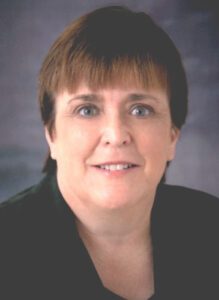
Vicky Otto is the executive director of the Precious Blood Spirituality Institute. She is also a Companion of the Missionaries of the Precious Blood.
![]()






